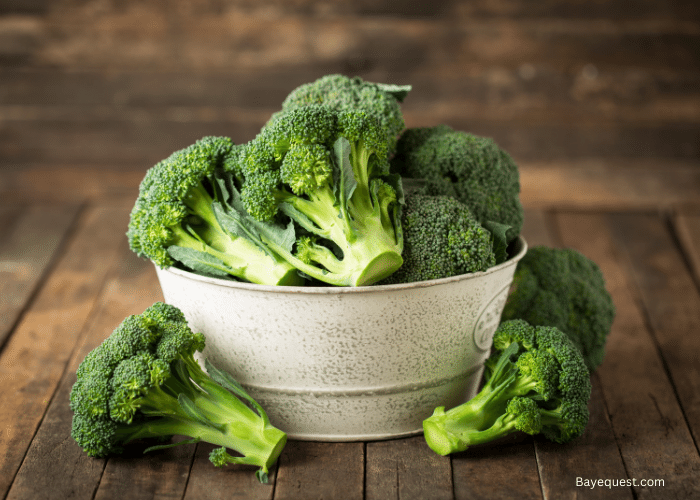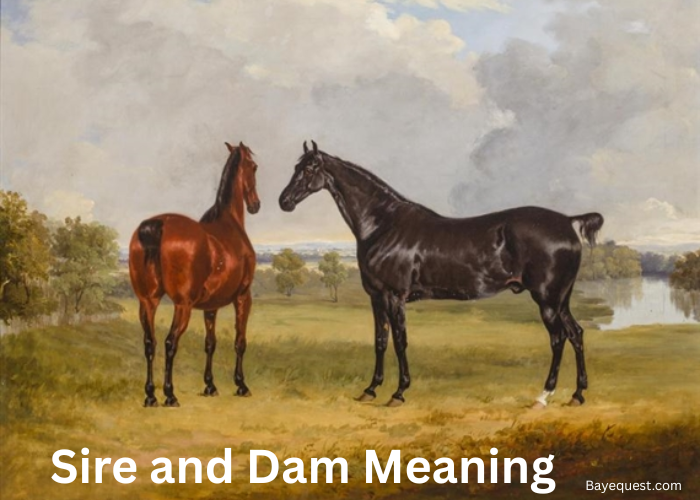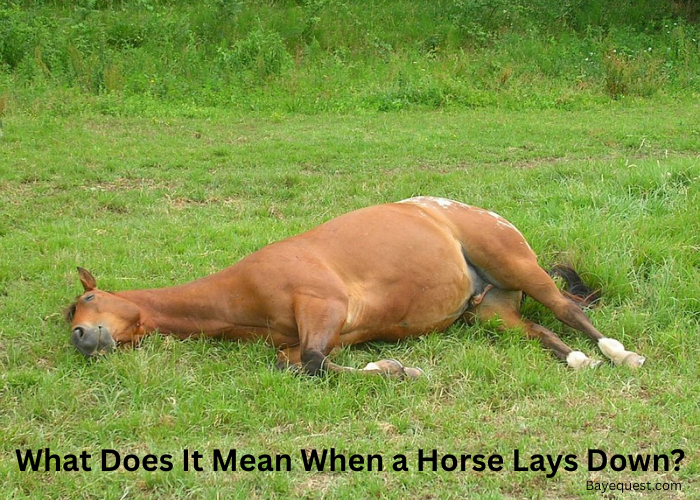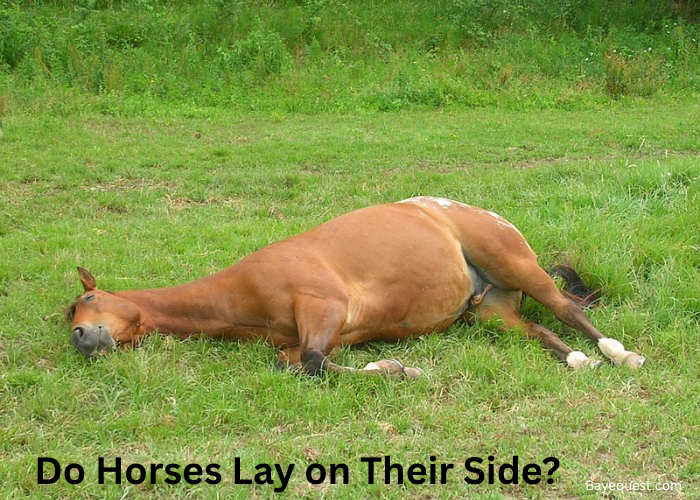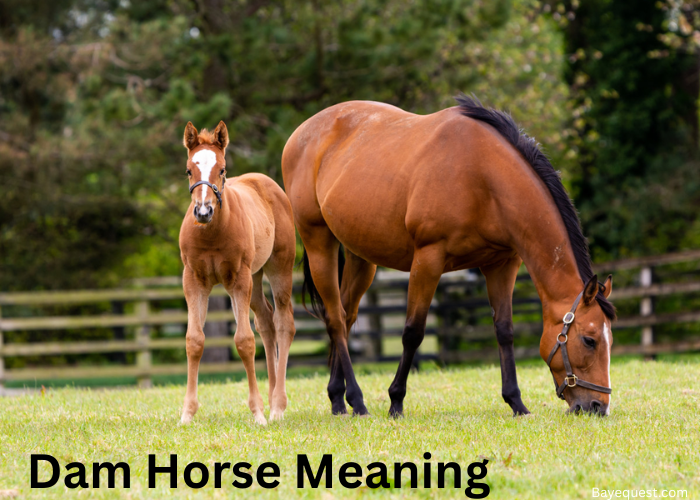Can horses munch on broccoli? You’re not alone. It’s a common question among horse owners looking to spice up their horse’s diet.
After all, broccoli is packed with nutrients beneficial to us, but what about our equine friends? This veggie can stir up quite the debate in the stable. Some swear by its benefits, while others warn of its risks.
This blog will investigate whether broccoli deserves a spot in your horse’s feed bucket. We’ll cover the good, the bad, and everything in between.
Stick around as we crunch through the facts.
Can Horses Eat Broccoli? Key Takeaway
Yes, horses can eat broccoli, but it should be given in moderation. Broccoli is rich in nutrients that can benefit horses, including vitamins, minerals, and fiber. However, it also contains compounds called goitrogens, which can interfere with thyroid function if consumed in large quantities.
Can Horses Eat Cooked Broccoli?
Yes, horses can eat cooked broccoli, but it should be offered in small amounts as part of a balanced diet. Cooking broccoli can make it easier for horses to digest and reduces the risk of choking hazards compared to raw broccoli.
Avoid adding seasoning, oil, or butter when cooking broccoli for horses. Like raw broccoli, introduce cooked broccoli gradually into a horse’s diet. This helps you monitor how your horse reacts to this new food and ensures it doesn’t cause digestive issues like gas or bloating.
Always consult your veterinarian before introducing new foods into your horse’s diet.
Can Horses Eat Brussel Sprouts?
Yes, horses can eat Brussels sprouts, but they should only have them in small amounts, like broccoli. Brussels sprouts are packed with nutrients but also have substances that can cause gas and bloating in horses.
Because of this, introduce them slowly to see how your horse handles them. Always chop them up to prevent any choking hazards.
Remember, when it comes to feeding horses any new food, moderation is key. And, as always, check with your vet before adding something new to your horse’s diet.
How Much Broccoli Should a Horse Eat?
When deciding how much broccoli to feed a horse, you must consider the horse’s age and size.
For an average-sized adult horse, up to one cup of broccoli once or twice a week is safe. Begin by introducing broccoli slowly to check for any adverse reactions, such as bloating or gas.
If your horse experiences discomfort, stop feeding them broccoli. When tolerated well, broccoli can be a nutritious treat but should never replace the mainstays of their diet.
For young horses or foals, introduce broccoli even more cautiously. Wait until they are several months old and have started transitioning to solid foods.
Begin with less than a tablespoon of small florets, making up only a tiny fraction of their daily intake. If any issues arise, immediately discontinue feeding them broccoli.
If there are no adverse reactions, broccoli can be offered sparingly as a rare treat, no more than once every couple of weeks.
Health Benefits of Feeding Your Horse Broccoli
Feeding broccoli to your horse can offer some nice health perks, thanks to its packed nutrient profile. Here’s what broccoli brings to the table:
Hydration
While water is the main source of hydration for horses, broccoli’s moisture content can contribute to their water intake. This is especially helpful in hotter climates or during dry seasons.
The water content in broccoli is not enough to meet their hydration needs on its own, but every little bit helps keep your horse hydrated.
Boosting the immune system
Broccoli is packed with Vitamin C, a powerful antioxidant crucial in boosting the immune system. Vitamin C helps protect the body’s cells from damage and supports various cellular functions of both the immune and nervous systems.
Regular Vitamin C intake can enhance the horse’s ability to fight off infections and recover from illnesses more quickly.
Bone health
Broccoli is a good source of Vitamin K, which plays a crucial role in bone health. It helps produce proteins required for bone formation.
This is more beneficial for young horses, ensuring their bones remain strong and reducing the risk of fractures.
Digestive health
The high fiber content in broccoli aids in maintaining a healthy digestive system. Fiber helps regulate the digestive process by promoting regular bowel movements and preventing problems like constipation.
This is important for horses that are prone to digestive disturbances, which can be life-threatening.
Antioxidant properties
Broccoli contains antioxidants such as Vitamin C and other compounds. These help in reducing oxidative stress in your horse’s body.
Oxidative stress can lead to cell damage and contribute to various chronic diseases, including arthritis and respiratory issues. Antioxidants help neutralize free radicals, protecting cells and promoting overall health.
Muscle and nerve function
Magnesium, found in broccoli, is essential for muscle and nerve function. It plays a role in muscle contraction and relaxation.
It helps transmit nerve impulses throughout the body. This is vital for horses, as their daily activities involve extensive muscle use, whether in training or casual riding.
Gut flora balance
Fiber aids in supporting a healthy balance of gut flora. A balanced gut microbiome is vital for proper digestion and nutrient absorption.
The fibrous parts of broccoli act as prebiotics. They feed the good bacteria in the horse’s large intestine, which can help improve overall gut health.
Weight management
Incorporating fiber-rich foods like broccoli can help manage a horse’s weight effectively. Fiber adds bulk to the diet without a significant increase in calories, helping to keep the horse feeling full longer.
This benefits horses on a weight management plan or those prone to overeating.
Toxin removal
Fiber helps in the elimination of toxins from the body. As it passes through the digestive system, fiber can bind to waste and toxins, aiding in their excretion.
This cleansing effect can contribute to better overall health and reduce disease risk.
Nutritional Content of Broccoli
Here’s a table that outlines the nutritional content of broccoli per 100 grams of raw broccoli:
| Nutrient | Amount |
| Calories | 34 kcal |
| Protein | 2.8 g |
| Total Fat | 0.4 g |
| Carbohydrates | 6.6 g |
| Fiber | 2.6 g |
| Sugars | 1.7 g |
| Calcium | 47 mg |
| Iron | 0.7 mg |
| Magnesium | 21 mg |
| Phosphorus | 66 mg |
| Potassium | 316 mg |
| Sodium | 33 mg |
| Zinc | 0.4 mg |
| Vitamin C | 89.2 mg |
| Vitamin K | 101.6 µg |
| Folate (Vitamin B9) | 63 µg |
| Vitamin A | 31 µg (623 IU) |
| Vitamin E | 0.7 mg |
How to Introduce Broccoli to Your Horse’s Diet
You should introduce broccoli to your horses carefully and gradually. Here’s a simple, step-by-step guide on how to do it:
Start small. Begin with just a few small pieces of broccoli. Think about the size of one or two tablespoons at most. This small amount lets you see how your horse reacts without overwhelming their digestive system.
Keep it plain. The broccoli should be plain, with no seasonings, oils, or butter. It’s best raw or lightly steamed to make it easier for your horse to chew and digest.
Watch closely. After your horse eats the broccoli, watch them for the next few hours. Look for any signs of discomfort like bloating or changes in their stool. If you notice anything off, it might be best to skip broccoli in the future.
Slow and steady. If all goes well with the initial taste test, you can slowly increase the amount you feed. But remember, broccoli should only be a small part of the diet, treated as an occasional snack rather than a main meal.
Consistency is key. Feed broccoli consistently as part of your routine checks for tolerance and acceptance, but always in moderation.
How to Prepare Broccoli for Horses
Preparing broccoli for your horse is straightforward and doesn’t require much fuss. Here’s how to do it in a way that’s safe and appealing to your horse:
Wash it well. First, wash the broccoli thoroughly to remove dirt and potential pesticides that could harm your horse.
Keep it simple. Serve the broccoli plain. There is no need for butter, oil, or seasonings, which are bad for horses and can upset their stomachs.
Cut it up. Chop the broccoli into small, bite-sized pieces. This will make it easier for your horse to eat and help prevent choking hazards.
Raw or steamed. You can offer the broccoli raw or steam it lightly. Steaming can make the broccoli softer and easier to digest, but don’t cook it too much. Overcooking can strip away some of the valuable nutrients.
Serve moderately. Remember, broccoli should only be a treat, not a main part of your horse’s diet. A small handful as part of a varied diet is plenty.
Health Risks of Feeding Your Horse Broccoli
While broccoli can be a nutritious treat for horses, there are certain health risks associated with feeding it that you should be aware of:
Gas and bloating. Broccoli is part of the cruciferous vegetable family, which is known to cause gas and bloating in some animals. Excessive gas in horses can be uncomfortable and may lead to more issues like equine colic.
Goitrogens. Broccoli contains goitrogens, substances that can interfere with the functioning of the thyroid gland. In horses, consuming large amounts of goitrogens over time can lead to thyroid imbalance.
Choking hazard. Broccoli can pose a choking hazard if not prepared properly, especially for horses. Cut broccoli into small, manageable pieces that are easy for the horse to chew and swallow.
Nutrient absorption. Like other cruciferous vegetables, broccoli might affect the absorption of certain nutrients, such as iodine.
Alternatives to Broccoli
If you’re looking for alternatives to broccoli, there are several other vegetables that are safe and beneficial for horses. Here are some good options:
- Carrots
- Celery
- Pumpkin (Read more on horses eating pumpkins in our guide.)
- Peas
- Turnips
- Apples
- Bananas
- Oranges
- Cucumber
- Grapes
- Strawberries
What Vegetables Can Horses Not Eat?
Horses have specific dietary needs and sensitivities, and certain vegetables should be avoided to prevent health issues. Here’s a list of vegetables that are not safe for horses to eat:
- Onions and garlic
- Potatoes and Tomatoes
- Rhubarb
- Avocado
Horses That Shouldn’t Eat Broccoli
While broccoli is a nutritious treat, there are certain situations where it might not be the best choice. Here are some examples of horses that should steer clear of broccoli:
1. Horses with digestive issues. If your horse is prone to gas, or bloating or has a sensitive stomach, it’s best to avoid broccoli. The vegetable can cause gas buildup, leading to discomfort or more serious conditions like colic.
2. Horses with thyroid problems. Because broccoli contains goitrogens, which can interfere with thyroid function, horses with thyroid issues should not eat broccoli.
3. Young foals. Very young horses, especially foals, should not be given broccoli. Their digestive systems are still developing; they need milk and specially formulated feeds.
FAQs
Can horses eat cucumber?
Yes, horses can eat cucumbers. Cucumbers are safe for horses and can be a refreshing, hydrating treat, especially in hot weather. They are low in sugar and calories, making them a good snack. Feed them in moderation and cut them into appropriate sizes to prevent choking.
Can horses eat bananas?
Yes, horses can eat bananas, including the peel, if desired. Bananas are a good source of potassium, vitamins, and natural sugars, making them a popular treat among horses. However, bananas should be given in moderation due to their sugar content.
Related read: Should horses eat bananas?
Can horses eat oranges?
Yes, horses can eat oranges. Oranges provide vitamin C and other beneficial nutrients. Some horses may enjoy the juicy, tangy flavor, but as with other fruits, oranges should be fed in moderation due to their sugar and acid content. Always peel the oranges to make them easier for horses to eat and digest.
Read also: How many oranges can a horse have?
Conclusion
So, can horses eat broccoli? Absolutely, but like any good treat, it’s all about moderation. Think of broccoli as a little extra something to spice up your horse’s mealtime—not the main course.
Start small, watch how your horse reacts, and always keep those portions in check. Remember, every horse is unique, so what works for one might not suit another.
And when in doubt, a quick chat with your vet can clear up any concerns. Happy feeding, and maybe your horse will come to love those green florets just as much as some of us do.




